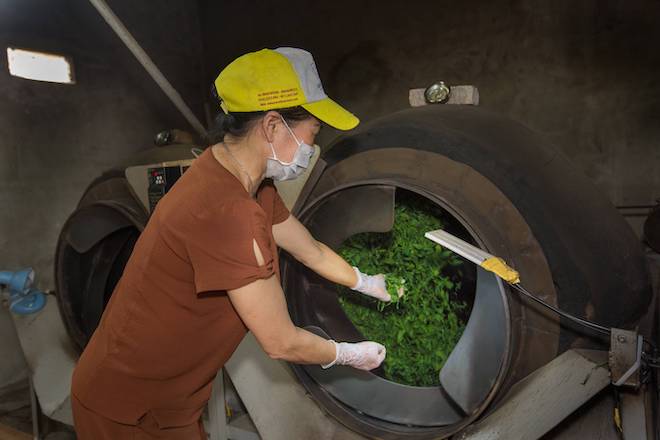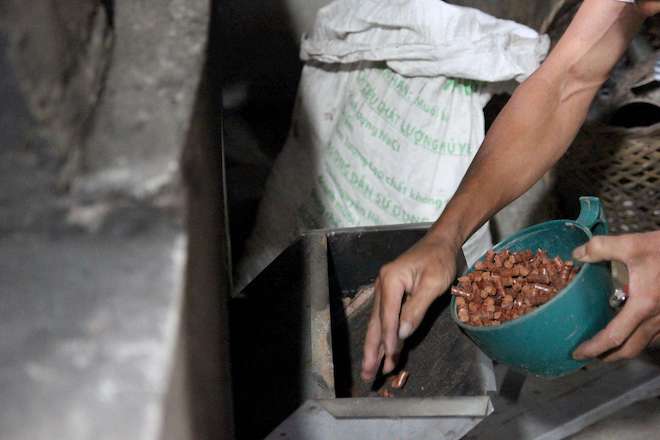
This article is published in collaboration with SWITCH-Asia.
Agricultural residues in Viet Nam are being treated as wastes, dumped, and burned causing pollution and waste of resources. For agri-micro and small enterprises, switching to a cleaner and cheaper source of energy has become urgent. A proper biomass-based energy technology which could turn agricultural residues into fuel for heating and processing purposes will not only meet this need, but also contribute to reducing rural pollution.
The EU funded SWITCH-Asia project, Biomass Gasification Technology—Sustainable Energy Solution for Agri-Food Processing and Waste Management in Rural Areas of Viet Nam (BEST) is addressing these challenges.
Surrounded by the scent of freshly brewed tea, Dinh Quy wiped the sweat off his brow as he put compressed sawdust into a biomass gasification stove. "Our cooperative used to use firewood to process tea. The burning fire and the high temperature, together with a lot of smoke and dust, made it [factory conditions] debilitating for workers."
The Tran Nam Clean Tea Cooperative in the Dai Tu district, Thai Nguyen province has been operating since 2019 with an annual revenue of around 3 billion Vietnamese dong ($122,379.12) from processing and selling clean tea.
Quy, the owner of a tea factory in the district, is always nervous about rising fuel prices. "Firewood is cheap, but it [stove] needs to be refilled every 10 minutes. The clouds of smoke from burning firewood imbue the tea and deprive workers of breathable air. Gas and electricity are cleaner, but they cost more. Therefore, we can only afford them for certain stages, such as drying and flavoring tea."
A better product
Quy and many other members of tea-processing cooperatives found a solution in the Dinh Hoa district where a tea dryer uses biomass gasification technology. Biomass gasification (VCBG) burns biologically derived materials (such as wood chip, sawdust, and agricultural waste) without oxygen to produce heat-generating syngas. The process produces hardly any smoke. Tea brewed using a VCBG stove does not taste smoky or sooty, and has better quality.
"The cooperative in Dinh Hoa strongly recommended this technology since it solved all their existing problems. After further discussion with the project's experts, I was completely reassured and decided to give it a try,” Quy recalled.
Quy's cooperative received support from the European Union-funded SWITCH-Asia initiative's Biomass Gasification Technology—Sustainable Energy Solution for Agri-Food Processing and Waste Management in Rural Areas of Viet Nam (BEST) project. This included provision of a VCBG equipment, training on its operation, technology transfer, on-site technical assistance, and consultation right from the start.
The Dai Tu district also received a biomass chopper from the project.
Having used VCBG for 6 months since the end of 2021, Quy had noticed a significant difference. This led him to convert his two wood stoves to VCBG stoves.
The smoke is clear and the factory is clean. Most importantly, the material for fuel comes from agricultural and forestry byproducts such as discarded branches and leaves, wood chip, or corn cob. These are cheap and readily available, greatly reducing production costs. Thanks to the VCBG technology, the gas and electricity bills of the Tran Nam Cooperative have fallen by D15 million per month. As a result, profits have increased.

Beyond the tea sector
As a midland and mountainous region with various forestry product processing facilities, the Thai Nguyen province has "excess" agricultural and forestry byproducts. However, most of these are thrown away or burned, causing waste and pollution.
Nguyen Hung Cuong, BEST project manager at Oxfam in Viet Nam, said: "Supporting cooperatives and micro and small enterprises in transitioning to greener, cleaner, and more sustainable production has always been our key focus. Biomass as a source of fuel, though large in quantity, remains untapped. Using biomass in VCBG technology not only contributes to reducing greenhouse gas emissions and effective waste management but also promotes the local circular economy model. The project helps businesses to convert to VCBG technology through building and operating a tripartite ecosystem of biomass suppliers, mechanics, and agri-processing micro and small enterprises."
This tripartite ecosystem is gradually being worked out with some initial successes.
Do Minh Ngoc, the owner of a peeled board factory also in the Dai Tu district, said that the shredded biomass from his business is being sold at D800 per kilogram (kg). This is a very competitive price compared with the D3,000 per 1 kg of pellets used as fuel.
Ngoc said that the huge volume of local biomass will bring great potential to suppliers for businesses using VCBG.
The first encounter of Xuan Tuyen, owner of a mechanical facility in the Phu Luong district, Thai Nguyen province, with this "simple" technology made him wonder if it could reach the required temperature or meet the stages of tea processing. "However, after selling VCBG equipment for a while, I’ve heard all good things. The heat level is more stable and the tea tastes more delicious without being smoky. The workers do not have to refill firewood at the scorching door, while their hands are free for other chores." Tuyen also saw revenues rise by several million Vietnamese dong thanks to the sale of VCBG stoves.
When asked about his future plans, Tuyen replied that he will continue to research and invent other equipment using the core VCBG technology to expand his business. "I’m developing a stove for a noodle shop so they can stop using coal and gas."
'Good and practical'
Quy hopes that more cooperatives in the region will learn about and use this "good and practical" technology. This will reduce the price of products, increase revenues, and protect the environment. "In order to realize that vision, services related to biomass supply must be continuous and available. Then, businesses will feel confident investing in the equipment and expanding production."
These initial successes are gradually confirming that VCBG technology not only utilizes rural waste as a smokeless and environmentally friendly fuel, but also solves problems for many businesses by generating more jobs for suppliers of biomass and mechanical equipment.
This article was published by SWITCH-Asia on 7 October 2021. It was originally published by Oxfam Viet Nam, in partnership with the Center for Creativity and Sustainability Study and Consultancy.


